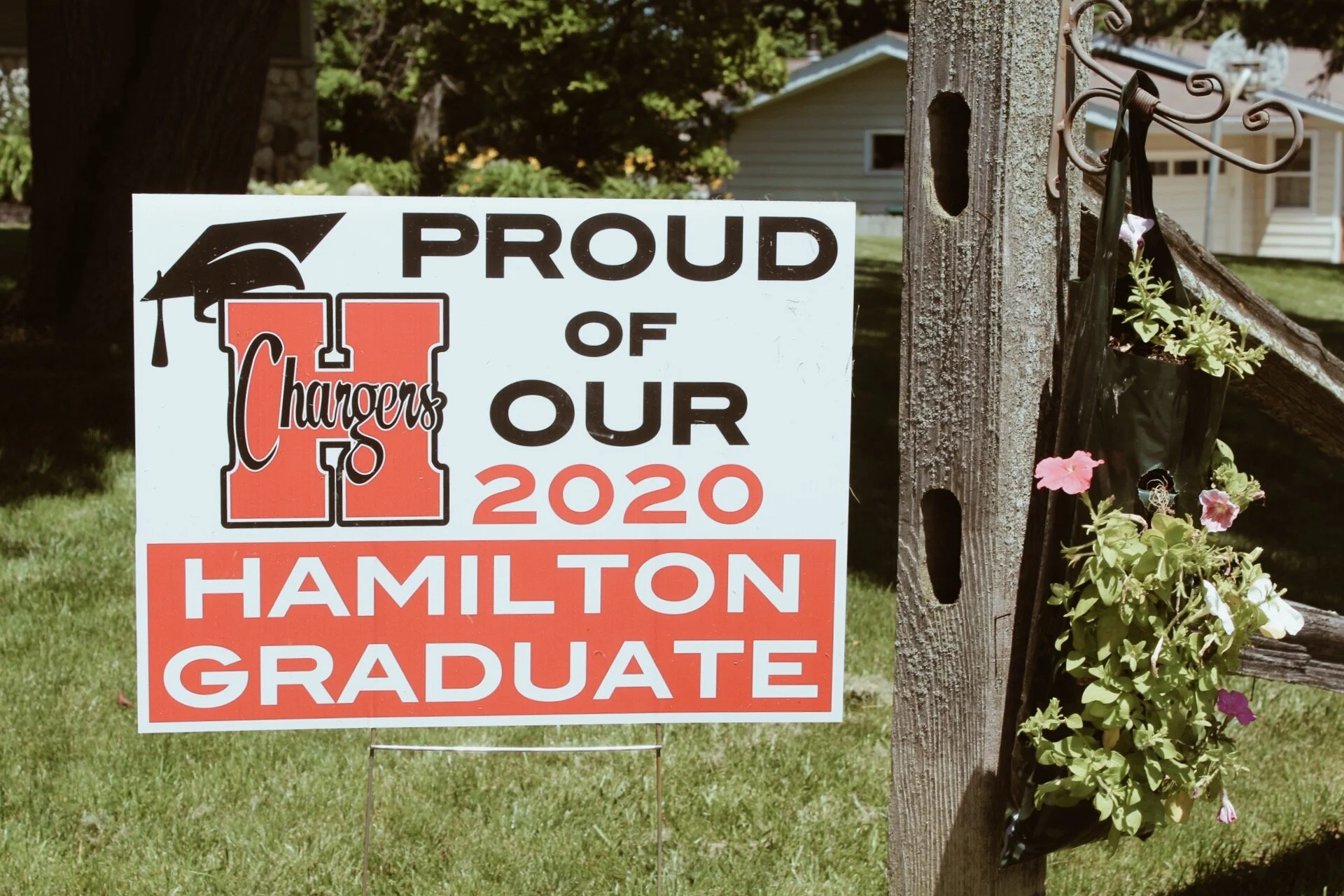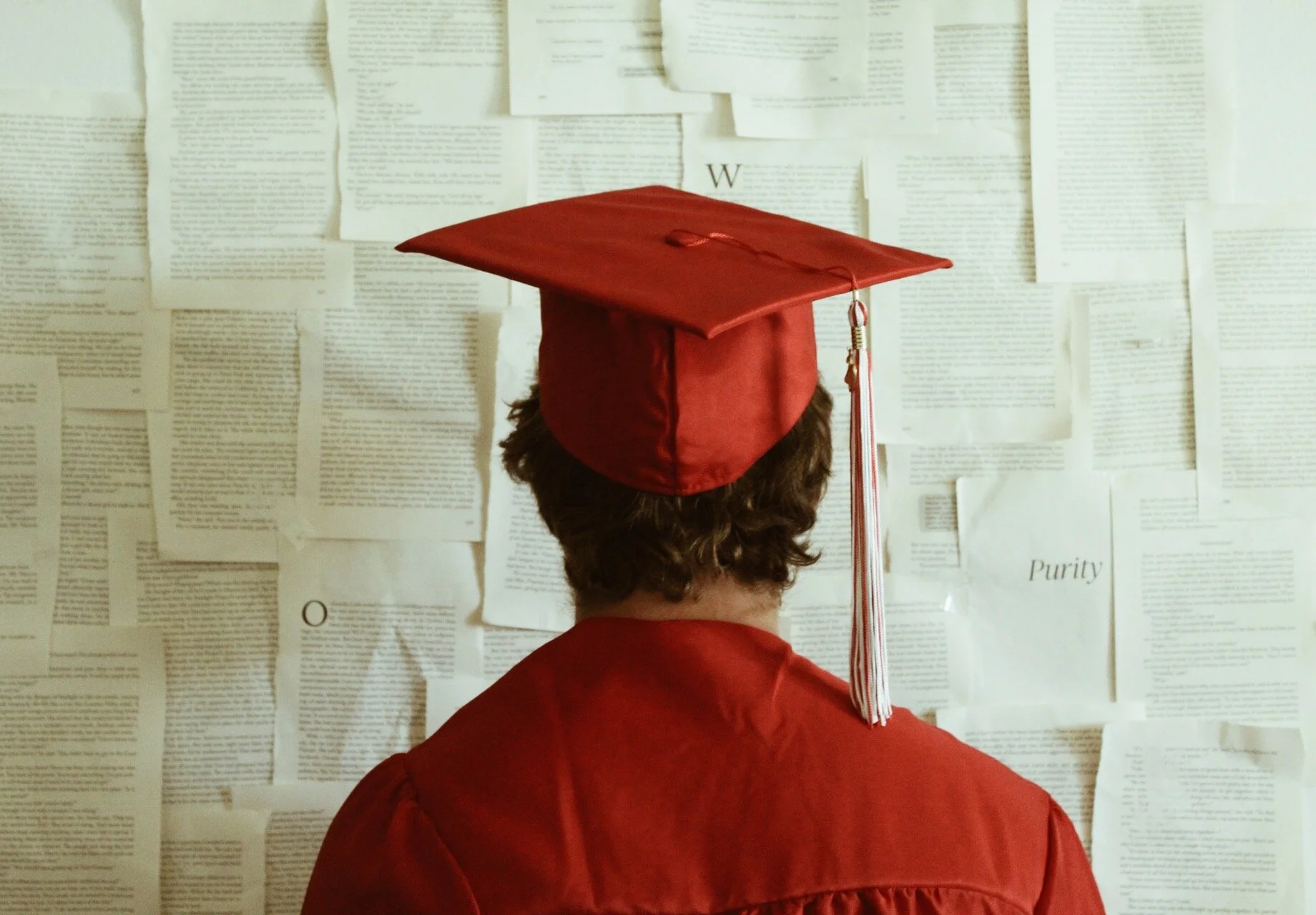Letters to the Class of 2020 from Mrs. Newcomer and Mr. Deshotels
Photo by Cora Kuhlenbeck.
There is a lot of research, dating back to the Ancient Greeks, about the importance of communication and making a first impression. This research revolves around the person you truly are, and the person you are perceived to be. In this world, when you initially meet someone, it takes that person approximately 4 seconds to make a judgment about you and about 30 seconds to finalize that judgment about you.
Malcolm Gladwell, an author and speaker in the areas of Sociology and Psychology, wrote a book entitled Blink, which explores the concept around humans “thinking without thinking.” Gladwell supports the quick judgment theory that is suggested by other researchers, and also that those quick judgments are fairly accurate and stand the test of time. He’s a proponent of a theory called thin-slicing, which states that we make a pretty accurate assessment of a person based on knowing them for only a few seconds.
“It is a central part of what it means to be human,” writes Gladwell. “We thin-slice whenever we meet a new person or have to make sense of something quickly or encounter a novel situation. We thin-slice because we have to, and we come to rely on that ability because there are lots of situations where careful attention to the details of a very thin slice, even for no more than a second or two, can tell is an awful lot.”
Well, I will have to admit that I “thin-sliced” this senior class since I arrived on July 1st of 2019. And in those moments when I interacted with you, I made the judgment that I was going to like you quite a bit. I recall thinking, “These students are mature. They are fun. They are advocates and hard workers. And, they are nice human beings.” As research would say, my instincts, or my “gut feeling” about you was right on.
But, I also want to give you another side of research, because I think we have all been on the other other side of judgment; of being perceived by others to be something we are not. We have been judged unfairly or according to bosses that others may have. So, this next information is twofold: it is to encourage you that it is possible to change people’s minds once they have an opinion about you, and it is also to remind you to have an open mind about others and give yourself opportunities to overturn your first impression of someone else. Another book, Thinking Fast and Slow, by Daniel Kahneman, offers a solution. He acknowledges that immediate judgments can be helpful, and in many situations, necessary. For instance, our fight or flight response and our ability to assess dangerous situations. But, we need to make sure we check our emotional responses with thought and reason. We need to purposefully and intentionally engage both our fast and out slow thinking responses and be contemplative and logical. Sometimes, we need to give others a second chance to make a first impression, and have hope that others will give us the same opportunity.
Very soon, you will be stepping out into a new world...meeting new people, and making lots of first impressions on others and vice versa. Whether it be in your new job, your college orientation, or your military basic training, carefully think about how you want others to perceive you and make sure you represent yourself in a way that makes your true character shine through for those thin-slicing moments.
As we part ways, I want you to know that I have many hopes for you, as I do with all of the graduating classes I have had the pride of sending off into the world; first of all, I hope all of you are happy and associate with people who bring you joy every day. I hope that you feel successful and supported in your work. I hope you find, and express, your authentic voice. I hope you continue to make positive first impressions. And, I hope you are okay with engaging that second system of thinking; that slow, rational and logical thinking, that allows you to give someone else a second chance. And, be humble enough to ask for forgiveness and the opportunity to get a second chance when you need one.
I wish you good fortune and many blessings as you leave us. And, I will be forever grateful that our paths crossed, even if for such a short period of time. Congratulations, class of 2020!
Sincerely,
Mrs. Newcomer
No graduating class in the last 100 years will have a story even remotely close to what this graduating class has. The story is still being told: the characters are the young men and women who can control some of the resolution, the setting is both global and local, and the conflict has everyone on edge. Antagonists range from an external unseen threat to public health, to an internal alarm within the heroes’ hearts and minds about becoming adults. But like every good story, the conflict makes people cheer for the heroes as they move forward through test after test of their character.
One part of the conflict we have heard a lot about over the last few months is uncertainty. Uncertain about public health, uncertain about elections, uncertain about what jobs will be in demand, uncertain about what is going to happen next fall, uncertain who you will become once you graduate. It is understandable. No one expected your final walk through the halls of Hamilton would be to leave in response to a pandemic in March rather than comparing caps, gowns, and graduation party invitations in June. Instead, some of you unexpectedly became teachers for little siblings, some of you became essential workers overnight, some of you unexpectedly became tech experts for parents who had to work from home. Interesting how leaders appear when uncertainty settles in.
Uncertainty is clearly in our midst, but we still know that doing the right thing is certain. Doing the right thing when uncertainty abounds means focusing back to the beliefs that shape our most unshakable core values. At Hamilton it is our Charger Way: Treat each other kindly with respect, manage ourselves thoughtfully, speak up when appropriate, and remain quiet when listening and critical-thinking is needed. In short: do the right thing. In uncertain times, I call each of you to rise to your better natures, your best impulses to do good. Do not resist the urge to help others, to care for yourself, to express love and kindness. That is what the hero in this story does.
As you face the difficulties of today, remember your foundation from the lessons of yesterday to face the uncertainty of tomorrow. Trust in who you are and who you will become. Trust in the people who have cared for you for so many years. And I think some of the uncertainty we feel will be met with the confidence of who we are and what we should do.
Hamilton graduates of 2020 have certainly demonstrated the ability to do the right thing and continue on in the story. You have proved your ability to adapt to new living and learning situations, and that adaptability is a defining quality that your graduating class has learned something few others have had to.
America’s original satirist Mark Twain said it well, “Do the right thing. It will please most people, and astound the rest.” Good satire always makes a serious point like this illustrating the rarity of knowing and doing the right thing. We Chargers know the right thing is about responsibility, respect, and relationships. With that knowledge, we can make it less rare. As you wrestle with uncertainty about the future, you can remind yourself that doing the right thing is never uncertain. Others will see you doing the right thing, and feel more certain in their own ability to do it too.
Mr. Deshotels






